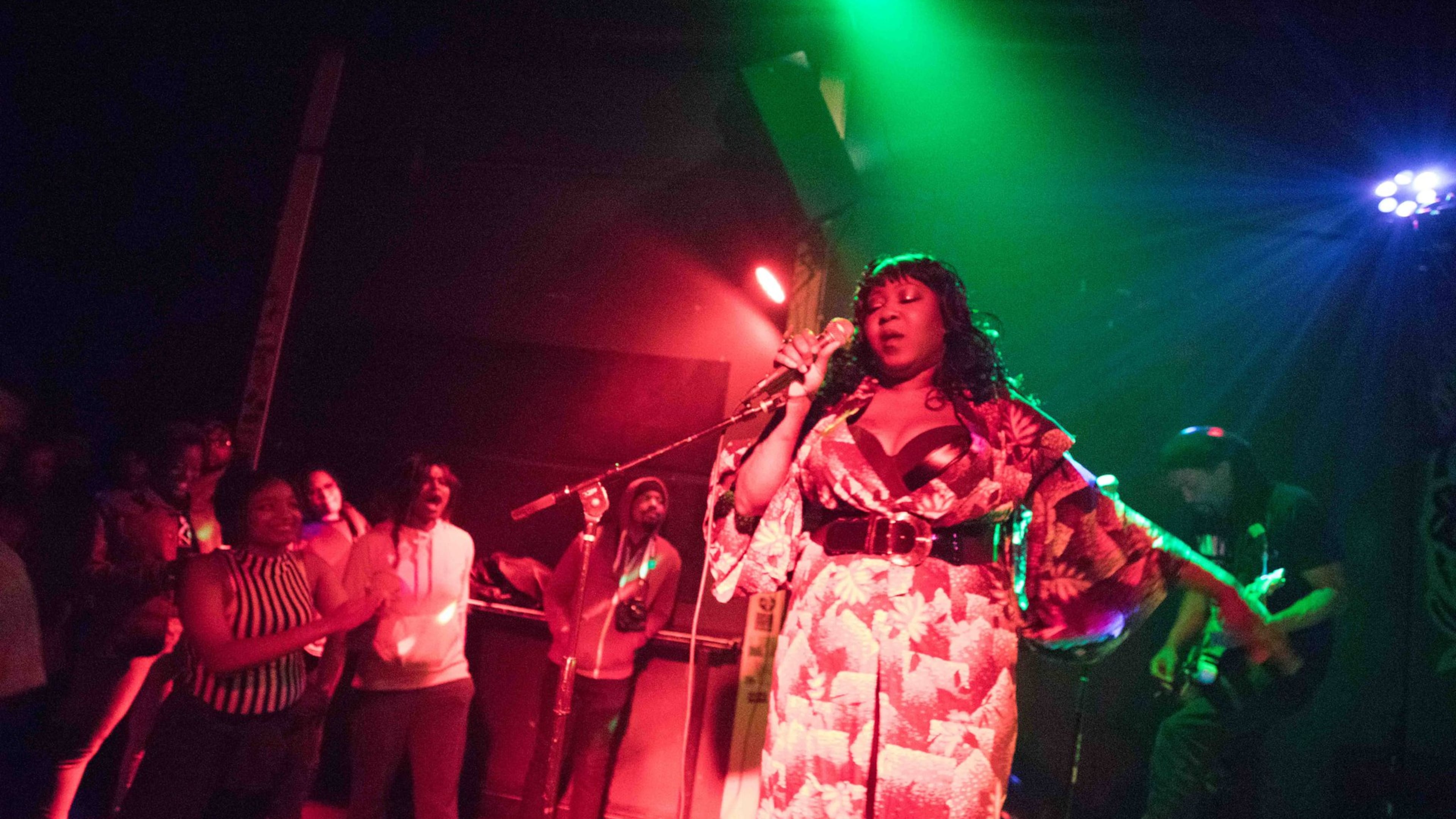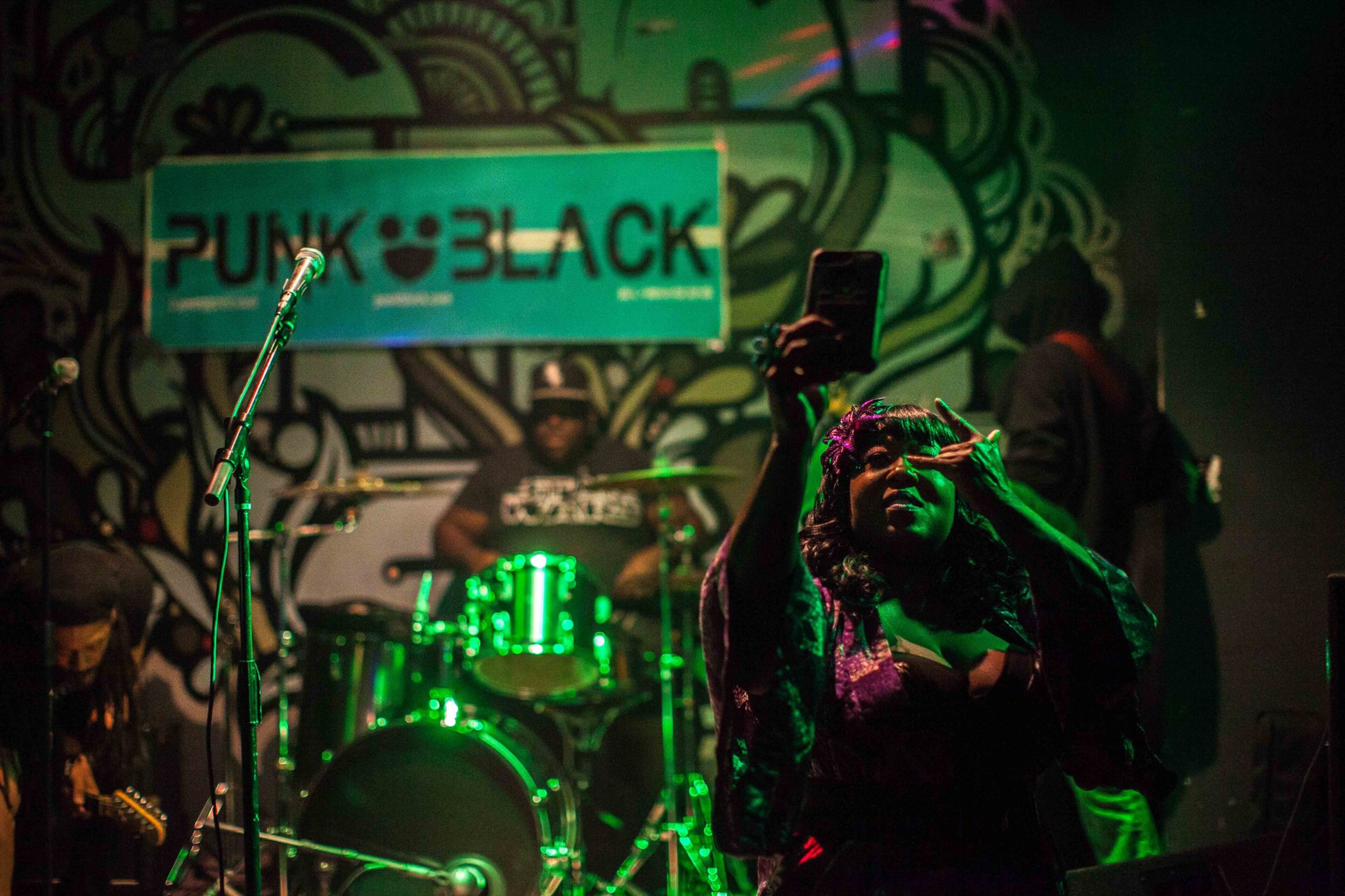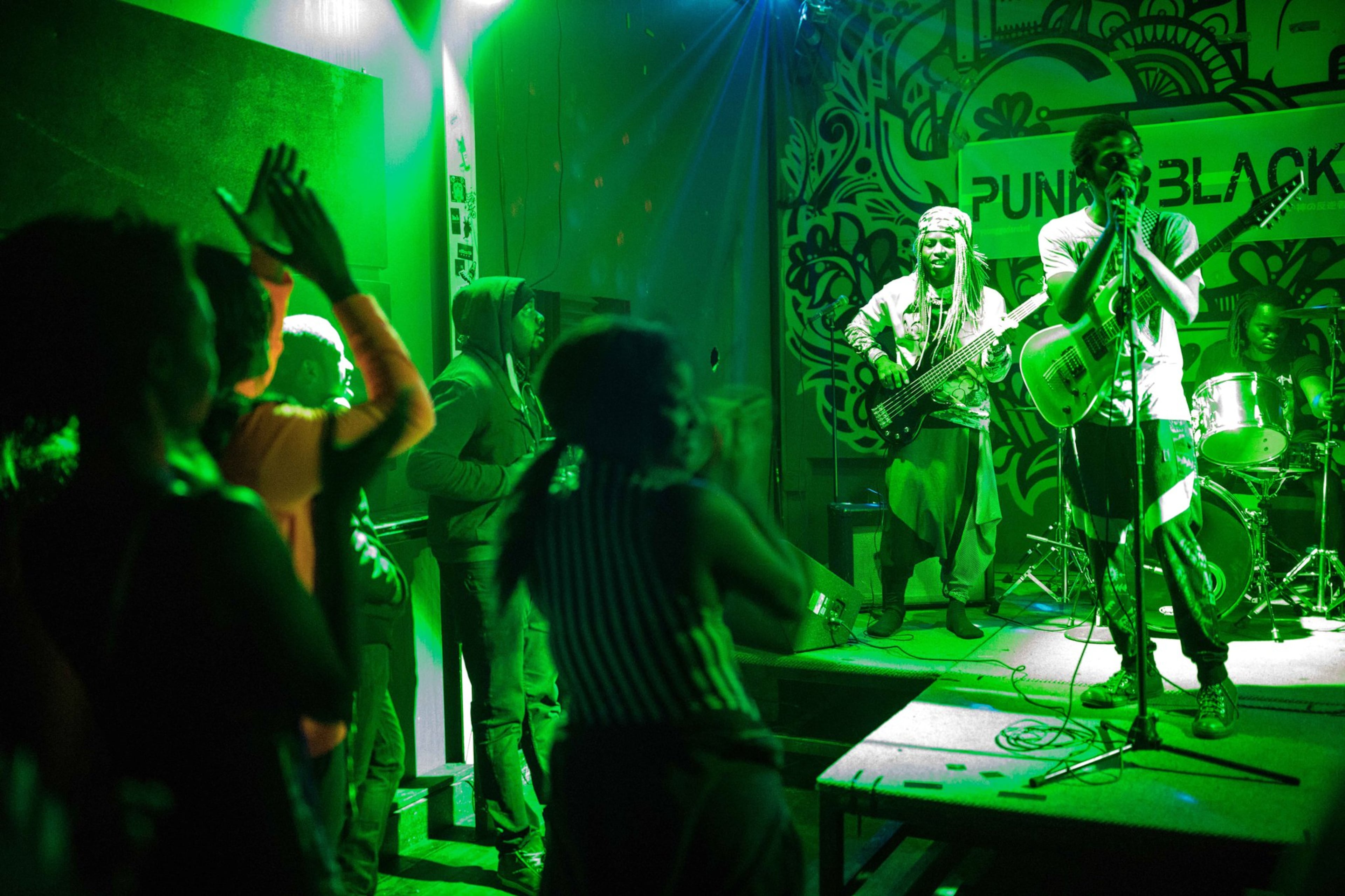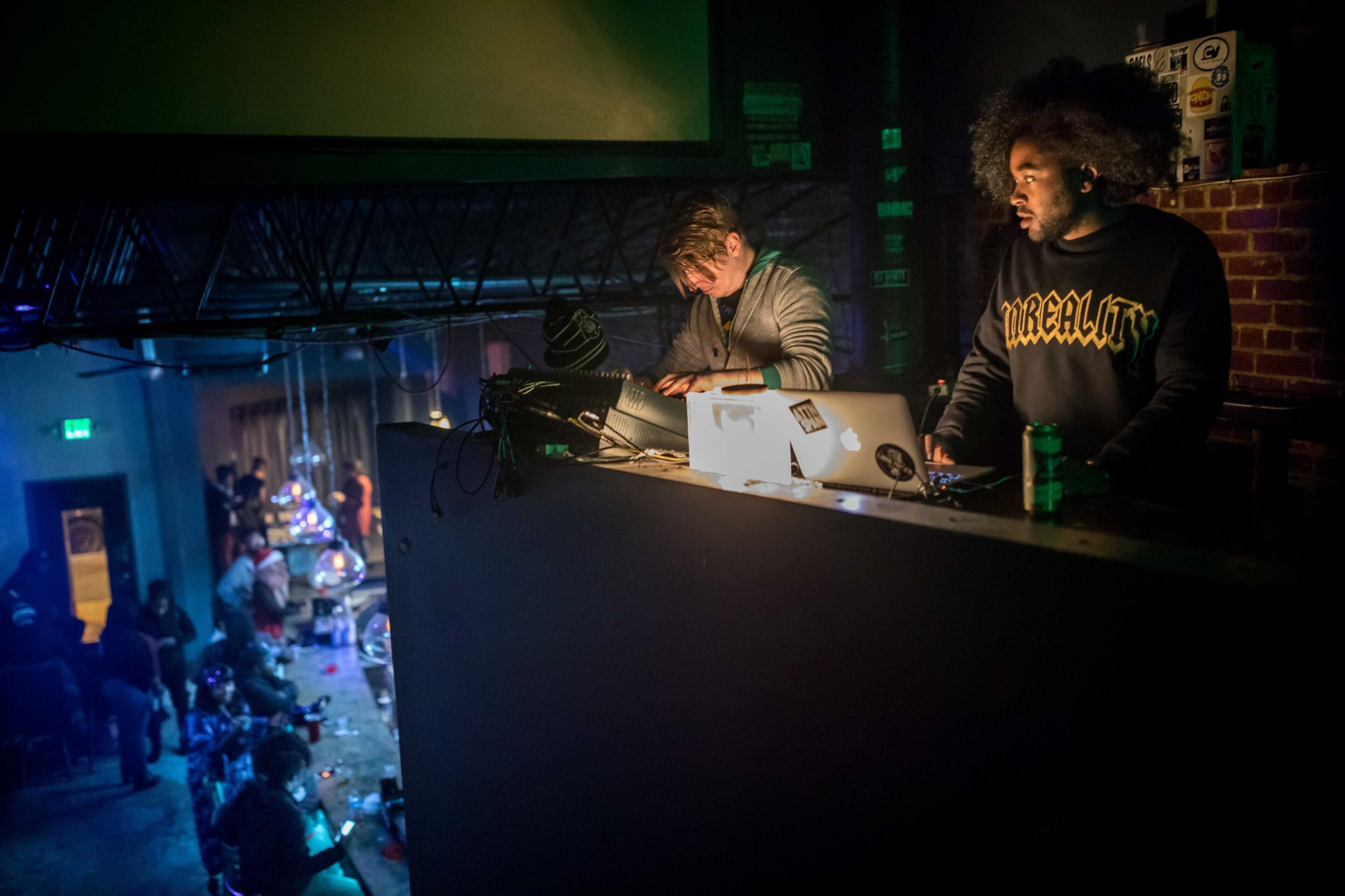
Buu’Ti Haus looks and acts the part of a punk rocker.
Wearing a loosely tied kimono, complete with heeled platform sneakers and a purple sequined flower in her hair, she stands on stage at Atlanta’s Union EAV bar and tosses a fistful of glitter into the faces of the delirious crowd of about 60 people.
The audience is a potpourri of black people. Some are dressed in button-up shirts and loafers. Others in ripped jeans, colored hair, ear gauges and piercings. One girl stands in front of the stage swaying and flashing icy blue eyes winged with black eyeliner.
» RELATED: Afropunk Fest 2017: 3 things to know about the Atlanta event
Buu’Ti Haus, whose real name is Denitra Isler, turns her back on the crowd to face her band, Conkrete GOD.
The drummer — large and shirtless with star-shaped tattoos across his chest — provides the tempo, followed by the bass and guitars, while Buu’Ti Haus winds her hips to the beat.
Buu’Ti Haus turns back to face the crowd.
“Are you ready?”
The music picks up and at 11:34 p.m. on a wintry Thursday night, there’s a mosh pit raging in the middle of Atlanta.
In the hip-hop dominated landscape of Atlanta, meet the underdogs of the city’s music scene.
Bands like Conkrete GOD and collectives like Punk Black are fighting to gain traction in a genre of music that isn't usually associated with black people — punk rock. The genre itself is on the fringes these days, but these groups are looking for a foothold.

This isn’t your father’s punk rock of the Ramones, the Misfits, Sex Pistols and the Clash.
"Of course, we all know the one rule, that it's dominated and ruled by white people," said Von Phoenix, the 27-year-old CEO of Punk Black and guitarist for the rock band Howling Star. "We know monetarily it is right now because they … stole it a long time ago. But it's really dominated by us. And if it's not really dominated by us, it's about to be pretty soon."
In the long shadow of hip-hop, rap and R&B, groups and artists like Cerebral Ballzy, Bad Brains and Big Joanie have been making headway in the genre.
» RELATED: Get in the holiday spirit with AJC Sepia's holiday playlist
And last week’s event showcasing Conkrete GOD, while not CBGB, might be a hint at the growing number of black and brown faces now embracing the music and culture.
“When you get into the essence of what rock ‘n’ roll really was, black people were always there,” said Georgia State University communications professor Christopher Daniel. “We can always say that rock ‘n’ roll was definitely a derivative of soul, blues or anything that we were doing.”
One of the vanguards of the movement today is Phoenix’s Punk Black, a six-member organization birthed in 2015 to “fight for representation to ensure people see themselves in the music they listen to.”
Punk Black co-founder Kharis Ellison met Phoenix when she was learning how to play the guitar. They quickly discovered that the two had a shared affection for punk music. But they were disappointed in the lack of diversity.
“Punk Black is basically taking the people who have sat in the back this entire time and forcing them toward the front. Forcing them toward the place where they can be acknowledged,” Ellison said.

Back in 2015, Punk Black hosted its first event in Atlanta’s West End. More than 50 people showed up, leading Ellison and Phoenix to discover there were a lot more black punk rockers than they thought.
In the beginning, Punk Black operated under one simple motto: Come through. We’re having a party featuring local black bands.
“We were mainly just hanging out with our friends. We would just play at different band members’ houses — get a PA system, put it together, get a little bar set up and have a good time there. It was just mainly about music,” Ellison said. “When we saw how much people wanted to be there … it just sort of fell naturally into (more).”
A PLACE TO CALL HOME, MUSICALLY
It’s loud outside the Stone Mountain home where Howling Star holds its biweekly jam session.
Inside, it’s so loud that band members repeatedly offer visitors earplugs while they run through their latest single “Gin,” a tongue-in-cheek take on gentrification.
Vocalist Jewels Andrea leads the headbanger, with Lucas Wolf on bass, Jovan Lecaro on drums and Phoenix on guitar.
For them, punk rock is about energy, attitude and community.
“Growing up in Atlanta, as far as the musical mold, I didn’t really fit in with a lot of stuff that was going on. Someone introduced me to tech music and punk music at the same time, which is pretty crazy,” Phoenix said. “It was just a place that I could kind of call home, musically.”
After the 45-minute rehearsal, one of the members leaves to go to work, while the others linger to talk about the music and where they want to take it. Vocalist Andrea sits beneath a big psychedelic piece of art, twirling the microphone in her fingers.
“It’s like a progressive version of all these sounds that people are doing, experimenting with or playing with,” she said. “It’s like of this age. It’s our generation. It’s our take on it.”
WAITING FOR THEIR TURN
GSU’s Daniel, who teaches journalism but writes extensively about music, said punk rock, like most genres of American music like rock and hip-hop, was born out of rebellion and a need to be different.
“It was just these guys in raggedy Chucks and skinny jeans playing in the places they could play,” Daniel said. “Literally playing from the heart.”

According to Daniel, there’s an umbrella of rock ’n’ roll, in which each rib represents a different subgenre, including punk rock.
Who has been holding the umbrella? Black people, Daniel said.
Taking it back to Elvis Presley, Daniel said a lot of what the “King of Rock ‘n’ Roll” was known for was a product of black musicians such as Bo Diddley “shredding on guitar” and Chuck Berry “skipping on stage.”
While hip-hop heavy hitters such as Migos, Lil Uzi Vert and Young Thug are what’s hot now, Daniel says if you look closely, it’s easy to see the punk rock influence from the dyed hair down to the Vans skater shoes.
“You’re starting to see the pants slim down a little bit. You start to see a little bit more chains as accessories, and you start to see more color, teased hair,” Daniel said. “People are starting to wear more piercings and tattoos … so it might not necessarily be the (punk rock) sound, but the whole image and personality from rock culture is really starting to come back to us, and what it’s really doing is starting to influence with mass culture again.”
Back at the Stone Mountain home, Howling Star is packing up and going their separate ways until the next rehearsal.
Phoenix unplugs his guitar from the amp and wraps up all of the cords. To him, the future of punk rock may be intertwined with hip-hop, but as with all things, it’s a cycle.
“Hip-hop and pop are in the super mainstream forefront,” Phoenix said. “But Punk Black’s main mission is when the circle comes back around to rock music, which it should pretty soon, we’ll be the leaders of that to sort of usher in the new rock age.”

